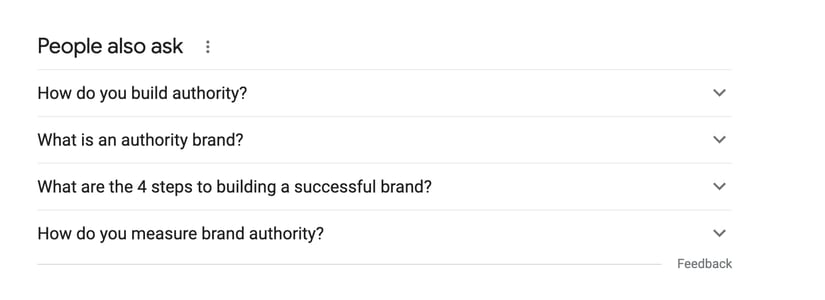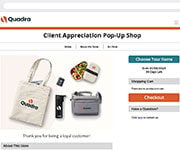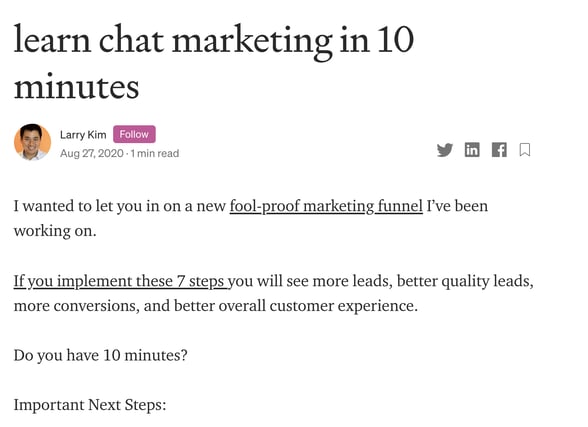Brand Authority - What it Is and Why You Need It
Brand authority refers to the level of expertise a company has earned in its industry or market. It measures how much a brand is recognized, respected, and trusted by customers, peers, and competitors.
Brands with high authority are often seen as industry leaders, providing reliable and valuable products, services, or information. They typically have a strong reputation and a loyal customer base, and their opinions or insights are highly valued.
Building brand authority involves consistently delivering on your brand promise, demonstrating thought leadership, and establishing a positive track record over time. Some of the biggest contributors include building a valuable resource library and establishing a strong online presence.
To kickstart your journey, here are five actionable steps for building brand authority in 2024.
1. Identify Your Audience’s Most Common Questions
Being an industry expert goes beyond knowing your product or services. It’s having a deep understanding of what your target audience wants to know. To do this, you have to understand what prospects are asking every day while considering a purchase.
We love to reference They Ask, You Answer. A philosophy coined by Marcus Sheridan, this approach to marketing and sales is all about obsessing over how your customers think, act, talk, and search to help you become one of the most trusted voices in your industry.
Figuring out what your customers are asking seems like an easy task, but it’s not always as simple as you think. Here are some ways to help you determine what your prospects are asking as they make their way through the buyer's journey.
Talk to Sales
The first thing you should always do is talk to your sales team. Who knows your customers better than the team in front of them directly daily? Find out what are the most frequently asked questions. How do they typically answer these questions, and what would help make their answering process smoother?
Become An Expert on Your Personas
Clearly defining each buyer persona and their unique path through the buyer's journey will help you better understand what your customers are asking, and when. This should be a regular exercise that you do monthly, quarterly, or biannually. The sales process and buyers' habits change. So it’s important to keep up to date with your buyer personas and the questions and problems that they face.
Keyword Research
Keyword research is a great starting point for understanding your prospect’s search intent. When done correctly, you’ll gain valuable insight into the words or phrases your prospects use to find answers related to your product or service.
There are many different keyword research tools available, each offering distinct features and varying price points. Here are a few of our favorite options:
One of our favorite ways of conducting preliminary keyword research is by analyzing the “People also ask” filter on Google. This lists various questions or related keywords that people are typing in related to your industry.

(Image: Search result on Google.com)
2. Create Authoritative Content That Answers these Questions
Now that you know what your audience is asking, it’s time to create authoritative content to answer these questions. But how do you ensure that your content is authoritative? A lot comes down to presentation.
Prospects want clear and concise answers to their questions. If you bury those answers inside large blocks of text, they’re unlikely to stick around long enough to find them. They’ll bounce from your page and end up on another site - likely a competitor’s - to find their answer.
The tone of your content is also important. Brands make the mistake of creating content filled with corporate language and industry jargon. But people buy from people. A big part of trust includes coming across as genuine and personal. Yes, your content should sound professional, but it should still sound personal. By talking to your buyers like humans, you’ll automatically create a sense of trust that will be associated with brand authority.
Here are some actionable tips to keep your content authoritative, straightforward, and audience-focused:
- Demonstrate Your Expertise: Use your knowledge and experience in your field to provide unique insights. Share case studies or real-life examples to show your expertise.
- Be Consistent: Consistency in the quality and frequency of your content can help establish your brand as a reliable source of information.
- Use Clear and Concise Language: Avoid jargon and complex language. Keep your content clear, concise, and easy to understand.
- Structure for Readability: Format content into easily digestible sections with headings and subheadings. Use bullet points, numbered lists, and images.
- Include Data and Statistics: Using data and statistics can lend authority to your content. Be sure to cite your sources.
- Stay Current: Regularly update your content to reflect the latest trends and developments in your industry.
- Add Value: Above all, strive to provide value with every piece of content you create. Whether it's solving a problem, providing new insights, or entertaining your audience, always aim to add value.
3. Use Social Proof to Your Advantage
Social proof is defined as a psychological phenomenon where people copy the behavior of others under the assumption that those actions reflect the correct behavior. Robert Cialdini studied this principle in depth in his book Influence: The Psychology of Persuasion. According to Cialdini, people view a behavior as more correct if they see evidence of others performing it.
Content should be real and come from real people or prospects. Here are some examples of social proof you can incorporate into your marketing and sales collateral:
- Case studies
- Customer reviews
- User-generated content
- Client testimonials or quotes
Effective social proof highlights your products or services in the words of your own clients. Prospects or potential buyers don’t care what you have to say about your business, they care what others have to say. Also, ensure your social proof includes data-driven results. Facts, figures, and proof are what start to define your brand as an authority figure. Here’s a great example from BuzzSumo.
(Image: BuzzSumo.com)
4. Brand Your Team as In-House Experts
What’s more authentic than a company? A person. That’s why it’s always a good idea to brand your business with the individuals behind the curtain. Brand trust comes from centering your company around people and painting them as authoritative experts in their field. The more customers can relate to your brand as trustworthy people who know what they’re doing, the faster your business will grow.
Think of Tesla, for instance. Their entire brand is built around Elon Musk. And when you think of him, do you think of him as an expert in his industry? Of course. Things get a bit more tricky for smaller, lesser known companies. But it’s still possible to establish authority around your team members. A great first step is to have subject matter experts on particular subjects within your industry.
For example, if you're a digital marketing agency, having one team member focused on paid advertising. This person would publish content relating to paid advertising, write emails to prospects related to paid advertising, and share insights on their personal social media pages. By establishing this person as an expert, prospects will understand who they need to communicate with when they have questions on this subject.
Let’s take a look at an example. Larry Kim, CEO of MobileMonkey and founder of Wordstream, is seen as an expert in conversational marketing and online advertising. Guess what he posts about? Conversational marketing and online advertising. As a result, people trust what he has to say, and automatically deem him as an expert in this field.
(Image: "Learn Chat Marketing in 10 Minuets by Larry Kim via Medium.com)
5. Be Genuine
Finally, the most important thing you can do to build brand authority is to be who you say you are. Be genuine. We can’t stress enough that business is all about people. By following through on your business promises, you’ll prove your trustworthiness to prospects and customers.
See, content and social proof only go so far. If you fail to provide an excellent user and customer experience, buyers won’t return, no matter how much authority you’ve established. Yes, you want to educate your prospects, but you also want to convert them. By being truly genuine and treating all your interactions as a personal relationship, rather than a business transaction, you’ll be one step further to establishing a strong foundation of brand authority.
Pro Tip:
Use this recently developed tool from Moz to measure your brand authority and identify opportunities for improvement. It’s a new metric that evaluates brand strength, assigning you a score ranging from 1-100.
Start Building Your Own Brand Authority
Building brand authority will be more important this year than ever before. In a market fueled by skeptical buyers and educated consumers, prospects need to know they can trust the brand they decide to do business with.
As you plan your marketing strategy for 2024, build it with a foundation based on brand authority. Remember, people buy from people. Use your authority strategy to lift up the curtain of your brand, and reveal the hard-working people behind it.
Get in touch if you need assistance building your brand’s authority. We’ll work with you to create and execute an integrated marketing strategy that builds trust across all your marketing channels.
Editor's Note: This post was originally published on March 31, 2021, and has been updated for accuracy and current best practices.
















